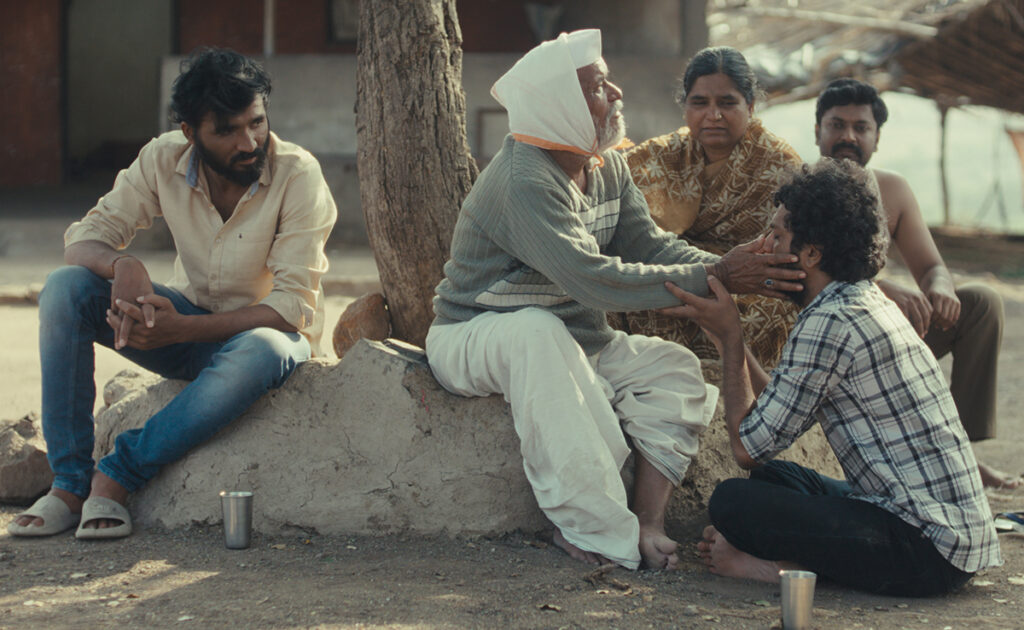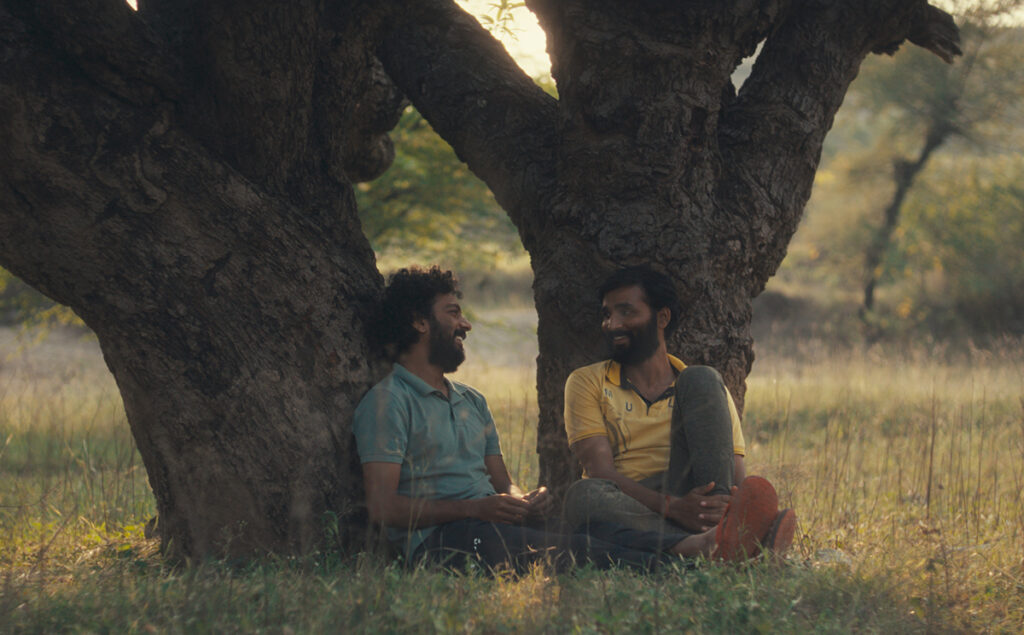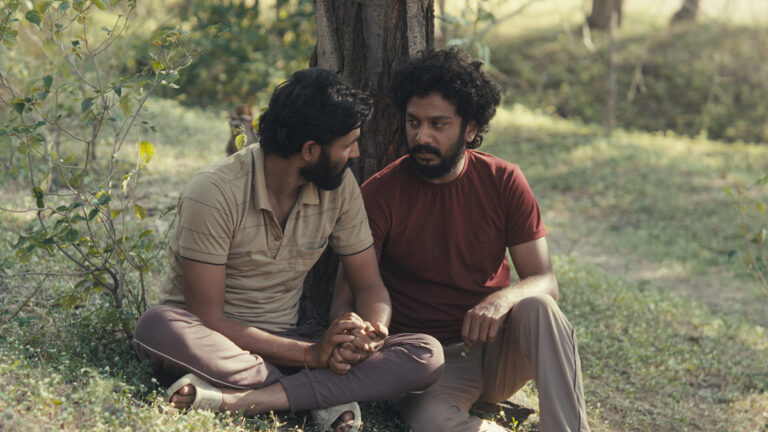In “Sabar Bonda,” Anand (Bhushaan Manoj), who hasn’t visited his village since moving to the city and is only known through old photos circulated among the villagers, returns to perform the funeral rites of his father, the only person with whom he could share his deepest secrets and pain with. The the traditional ten-day period of mourning is meant to bring peace and healing. Yet it only opens old wounds, as Anand feels unwanted and like the black sheep of the village. He is perceived as a pariah due to his bachelor status, incurring judgmental and inquisitive stares following him around.
However, an old romance comes to Anand’s rescue when he reconnects with his ‘special friend’/lover Balya (Suraaj Suman), accompanying the local milkman/shepherd on his delivery rounds in the early mornings. This opportunity leads to some much-needed fresh air to sort his head. It allows them to flout a long list of imposed restrictions, break free from the cooped-up atmosphere at home, and cope with an overwhelming and unbearable loneliness. While Anand also overcomes his long-standing dread of riding a bike on these trips, can he confront his fear of loving openly… especially coming out to his conservative community? Will his pain and guilt over hiding not just grief, but simultaneously his identity ever subside?
A Celebration of Love
Filmmaker Rohan Parashuram Kanawade impresses with his much-raved about feature debut, which made history at Sundance as the first Marathi movie to premiere at the festival and also win the World Cinema Grand Jury Prize Dramatic. “Sabar Bonda” (transl: Cactus Pears) isn’t just a sombre story about barren hearts yearning for love and acceptance amidst heartbreak and other obstacles. It also serves as a celebration of a love that thrives in barren landscapes despite differences. The storytelling and direction, too, merits from Kanawade’s personal touches that add authenticity and the queer gaze prominently featured in it.
These aforementioned aspects of the movie shine through in the central romance between Anand and Balya (the former a graduate earning in the city, the latter who is a high school dropout). Anand’s burning love for Balya—whom he’s known since childhood—never dims nor dissipates. He never invalidates Balya or treats him unequally, either for a lack of education or a high paying job. Intimacy, pleasure, and wanting are not just seen or shown in “Sabar Bonda,” but also felt. Slight touches or longing gazes transition into full-blown amorous embraces in the blink of an eye, thus conveying the genuine passion between the inseparable pair.
Of Stigma and its Burdens
The bond between Anand and his mother also effectively ties in to the recurring theme of love eclipsing all underlying differences, and it too is portrayed in an optimistic and frank manner. Despite a generational gap and their varying stance on traditions (she is strict about observing the entire rigorous ritual while Anand yearns to leave early and not prolong his stay), Anand’s mother nevertheless serves as an ally to her son. This is even when she is alone in her own mourning for her husband and utilises these ten days to bridge the gap and nourish the withered relationship.

The movie also showcases Anand navigating built-up inner conflicts such as shuttling between happy memories of his father at home and days spent later by his bedside at the hospital (all of which only remain in the photo gallery of his phone now). This is as well as moving away and losing touch with his lover entirely, with Balya questioning whether he will even remember the colour of his eyes once he departs for the city. Even the village which once felt familiar, romantic, or nostalgic to him as a child has lost its sheen to Anand.
Breaking Free from Chains
While he harbours a desire to hold such precious memories close to his heart, they’re simultaneously prickly and sting him—much like the titular cactus pear. Frictions between him and the villagers escalate, with nosy elders dredging up his thirty-something shelf life and pestering him to marry within a year due to his father’s passing. Yet Anand wishes to be reborn as a free bird, much like the proverbial ‘Shradh crow’ that disappears into the night, invisible to mere mortals who can only gawk at its footprints. Balya, too, shares a recurring dream of them both sitting underneath the privacy of a mango tree. But these dreams will never find fruition in a village where people shut themselves off or stuff their feelings behind closed doors. It’s a place where one feels suffocated more than a crowded city, despite its vast, open fields as far as the eye can see.
Furthermore, Anand expresses concern over facing ostracism from the villagers if or when he decides to come out. He is already vulnerable to their hostility as they frown upon him from the get-go for thwarting tradition, consider him ‘inauspicious’ for “missteps” such as wearing a black shirt at the funeral. He remains unchanged in their perception even after he changes out of the said outfit, greeted with disapproval he—an unmarried man—lights his father’s funeral pyre. Thus, he subjects his mother to silent treatment due to the shame and conflict arising from this dilemma. On the contrary, she is indifferent to the villagers. She wishes her son would open up more, rather than paying heed to those who object, oppose or find offense to his personal life.
A Slow-Paced, Queer Romance

The performances bolster the movie with Bhushaan Manoj showing promise with his expressive eyes as Anand. His chemistry with co-star Suraaj Suman (as Balya) also stands out. Additionally, Jayshri Jagtap offers a subtle yet endearing performance too as Anand’s mother.
Overall, this slow paced but contemplative queer romance quenches the thirst for cinema that isn’t afraid to boldly make a stance against or challenge conservative Indian mentality. Remarkably, it also does so without diluting the queer gaze in favour of heteronormativity.

*Cactus Pears (Sabar Bonda) is set for a UK premier at the SXSW London festival (screening dates 2nd and 7th June).


